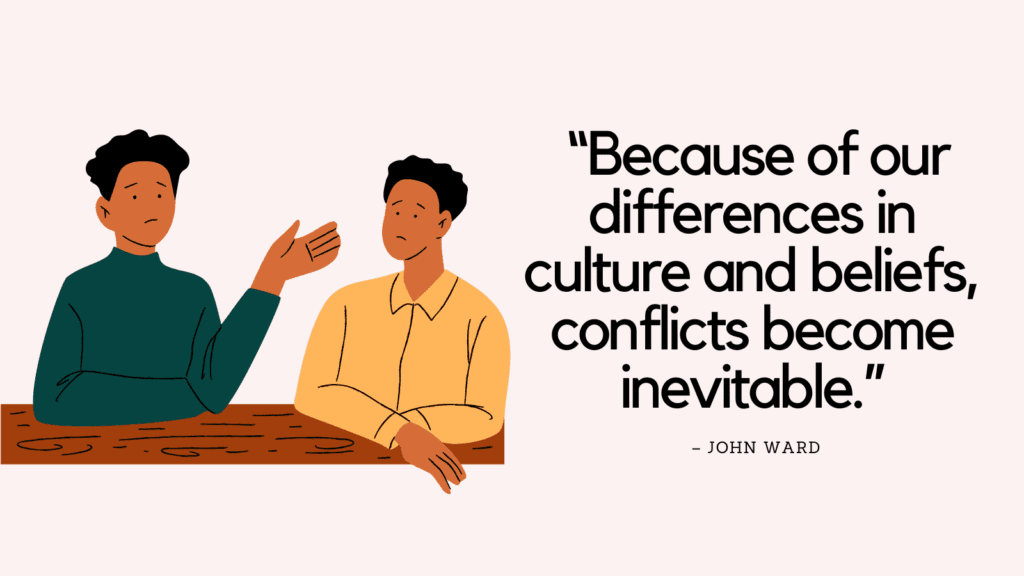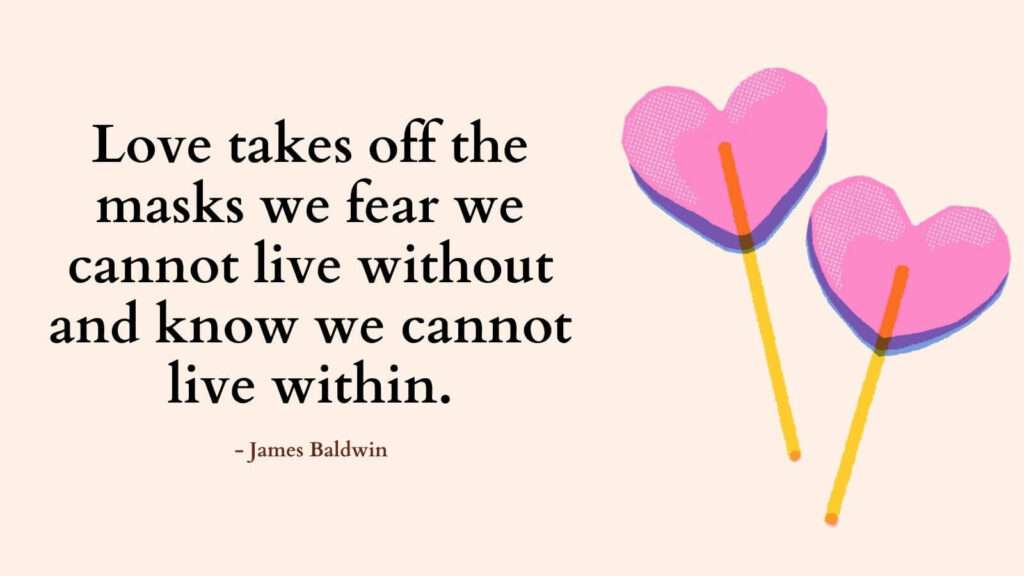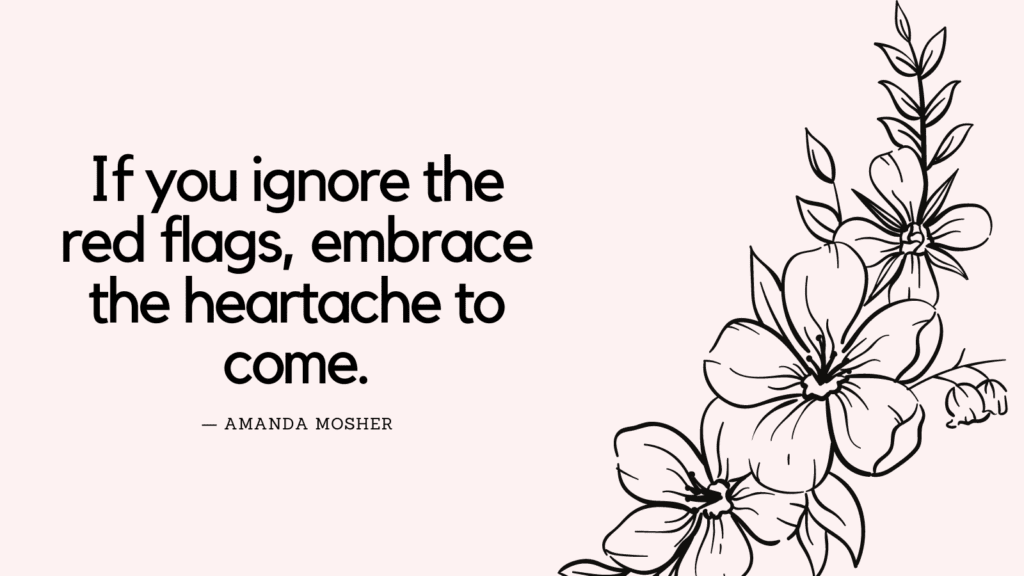This post contains some of the best conflict resolution quotes.
Conflict Resolution Quotes
1. “A healthier approach to a conflict requires respect and understanding.” – John Ward
2. “Because of our differences in culture and beliefs, conflicts become inevitable.” – John Ward
3. “Calmness plays an important role in communicating and keeping your conversation organized. Keeping calm during conflict resolution requires patience.” – John Ward
4. “Choosing to be respectful in conflict resolution will guide a person’s words and actions during a confrontation. When you respect the other person, you make the effort to be calm and non-adversarial in your speech and conduct.” – John Ward
5. “Compromise is a positive way of solving the problem and getting everyone to recognize that they play a crucial role in conflict resolution.” – John Ward
Related: Do’s And Don’ts Of Effective Communication
6. “Conflict resolution should be looked at as a case to case basis. No disagreement can be tackled the same way. There is no formula for it. You have to approach it with patience and diligence.” – John Ward
7. “Conflicts will arise one way or another and when conflicts are not confronted, it does not resolve itself. The emotions you feel might temporarily fade away but since the issue has never been resolved, it comes back up. It only takes another trigger and you are back to those feelings again.” – John Ward
8. “Do not let previous conflicts get entangled with the present. You will only find it more difficult to communicate clearly and assess both you and your peer’s issues accurately if you keep bringing up issues that happened in the past. Holding grudges and placing blames will only clutter your mind and put a strain on your emotions.” – John Ward
9. “During the conflict, there are two things you must be good at expressing yourself and listening.” – John Ward
10. “Emotional intelligence is the essential life skill that helps you understand, utilize, and manage your emotions such that you can relieve stress and empathize with others. This skill is also crucial in overcoming challenges, communicating effectively, and defusing conflict between people.” – John Ward
Related: Top 25 Relationship Journal Prompts (+FREE Worksheets PDF)
11. “Feeling threatened whenever you confront conflicts can be a problem. You will likely respond to conflict by closing off or expressing things with bias and sometimes anger. This is not a healthy way of managing and addressing disagreements.” – John Ward
12. “For most people, conflict is like voluntarily having a colonoscopy or root canal without anesthesia. Even people that seem to enjoy arguing don’t enjoy when they feel powerless, which is the worst part of conflict.” – Hesha Abrams
13. “For people to address these worries more easily, they should see conflicts as an opportunity for growth more than a battleground. The fear of conflict can skew your perspective of things and take your focus away from problem solving and resolution. Removing this fear is more challenging for people who have been in traumatizing unhealthy relationships and painful experiences from previous disagreements. These people tend to view conflict as a terrifying, demoralizing, or humiliating situation.” – John Ward
14. “How many wars, conflicts, and fights start with a misunderstanding?” – Hesha Abrams
Related: How To Become A Stronger Empath? Top 20 Actionable Empathy Exercises to Become More Empathetic
15. “If you always desire positive resolution of conflict, you will be much more patient with the process.” – John Ward
16. “If you are going to enjoy thriving relationships and sustain them long-term, you must become intentional about how you can resolve conflicts positively.” – John Ward
17. “If you are not aware of how you speak and how you behave based on the emotions you are having, it can lead to misunderstandings and mishandled conflict resolutions.” – John Ward
18. “If you are trying to resolve conflict and the people get into a fight, try to calm them down, and if it doesn’t work, get them to walk away from the situation. You can always encourage them to come back to the table when they are calm because, again, issues will come and go, but we must maintain the sanctity of relationships.” – John Ward
19. “If you truly aim to harness your social intelligence, then approach conflict resolutions respectfully and objectively.” – John Ward
20. “Pick your battles. Some conflicts are not worth your time and energy to resolve. If you see a stranger’s comment on the internet that is against your beliefs, think about how much it matters to you first and if it is worth your time and energy to discuss things with this stranger.” – John Ward
21. “The first thing to remember about resolving conflicts is that the goal is not to win or be right. The goal is to strengthen and maintain relationships. You are arguing not to argue, you are arguing to settle both you and your peer’s issues.” – John Ward
Related: Top 19 Emotional Intelligence Activities (To Improve Low Emotional Intelligence)

Tips for Conflict Resolution
Conflict resolution is an important skill that can help improve relationships and reduce stress. Here are some scientifically supported tips for effective conflict resolution:
1. Remain calm and composed: Conflict can trigger strong emotions, but it’s crucial to stay calm and avoid becoming defensive or aggressive. Take deep breaths, practice relaxation techniques, and strive to maintain a level-headed approach.
2. Listen actively: Truly listen to the other person’s perspective without interrupting or formulating your response in advance. Show genuine interest by maintaining eye contact, nodding, and paraphrasing their concerns to ensure understanding.
3. Express yourself assertively: Clearly and respectfully communicate your thoughts, feelings, and needs using “I” statements. Avoid blaming or attacking the other person, as this can escalate the conflict. Instead, focus on expressing yourself constructively.
4. Seek common ground: Look for areas of agreement or shared interests. Finding common ground helps build a foundation for resolving the conflict and encourages cooperation. Explore potential solutions that meet the needs of all parties involved.
5. Practice empathy: Try to understand the other person’s feelings and perspective. Empathy allows you to connect emotionally and fosters mutual understanding. Acknowledge their emotions and validate their experiences.
6. Use positive body language: Non-verbal cues play a significant role in communication. Maintain an open posture, use appropriate facial expressions, and avoid crossing your arms or displaying defensive body language. This can help create a more receptive atmosphere.
7. Collaborate and compromise: Work together to find mutually agreeable solutions. Be willing to make concessions and consider alternative perspectives. Collaboration and compromise foster a sense of fairness and promote long-term relationship satisfaction.
Conclusion
Conflict resolution takes practice and patience. It’s essential to approach conflicts with a willingness to understand, collaborate, and find resolutions that meet the needs of all parties involved.



